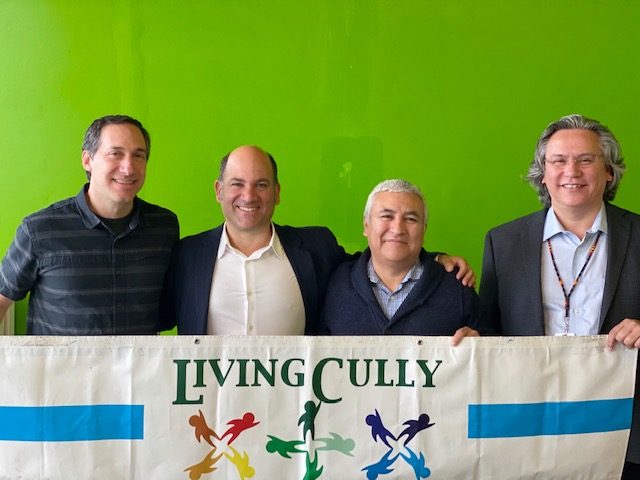Living Cully members sign five-year agreement to continue partnership

[Image Description: The directors of the four Living Cully organizations signed a new five-year partnership agreement on October 23. (l-r: Steve Messinetti, Habitat for Humanity; Tony DeFalco, Verde; Ernesto Fonseca, Hacienda CDC; Paul Lumley, Native American Youth and Family Center)]
The four Living Cully member organizations — Habitat for Humanity Portland/Metro East, Hacienda CDC, Native American Youth and Family Center (NAYA) and Verde — reaffirmed their collaborative efforts on behalf of people of color and low-income residents of Northeast Portland’s Cully neighborhood by signing a new five-year memorandum of understanding (MOU) on October 23.
The new MOU further cements the Living Cully partnership, and establishes the following purpose of the coalition:
The Living Cully coalition unites four non-profit community development organizations in a collaborative, long-term, community-led effort to improve the quality of life for people of color and low-income people in Northeast Portland’s Cully neighborhood, and ensure that Cully will always be a place where people of color and low-income people can live and thrive. This work requires a dual-emphasis on community-led neighborhood improvements and robust efforts to combat gentrification and displacement.
Since 2010, the Living Cully partners have joined forces and worked with residents to bring community development resources to Cully, which is one of Oregon’s most diverse neighborhoods and home to roughly 50% people of color. Working together, the four organizations have celebrated incredible successes in recent years: the opening of the 25-acre Cully Park; the acquisition of the former Sugar Shack strip club property; the preservation of the Oak Leaf Mobile Home Park; the establishment of strong grassroots community organizing groups among renters and mobile home residents; and the development of some 500 new affordable homes (including those currently in some stage of planning or construction).
The Coalition’s work is coordinated by a small staff housed at Verde, which is designated in the MOU as Living Cully’s “backbone organization.” Living Cully’s scope of work includes collaboration and resource-sharing to strengthen the four organizations’ individual projects and programs, as well as additional projects and programs carried out by coalition staff under the banner of Living Cully — including community organizing and policy advocacy.